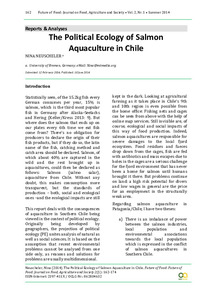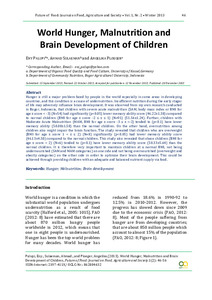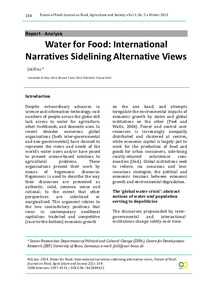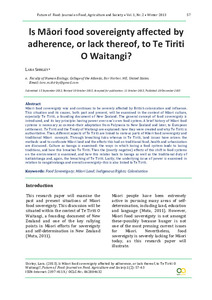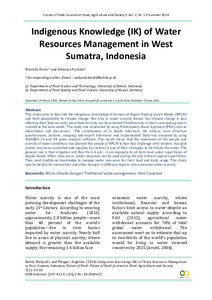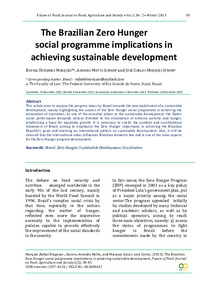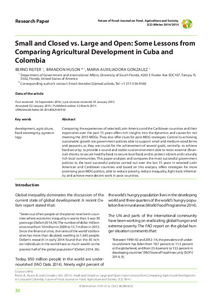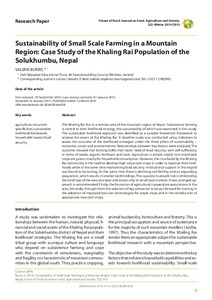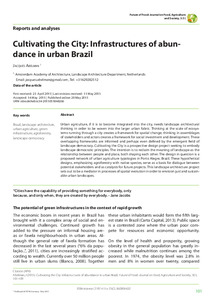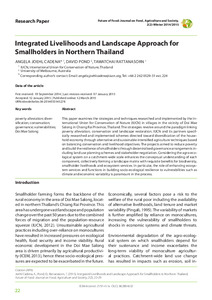Suche
Anzeige der Dokumente 21-30 von 84
Aufsatz
 The Political Ecology of Salmon Aquaculture in Chile
The Political Ecology of Salmon Aquaculture in Chile
(Department of Organic Food Quality and Food Culture at the University of Kassel, Germany and Federation of German Scientists (VDW), 2014-06-10)
Every German consumes per year, 15% is salmon, which is the third most popular fish in Germany after Alaska-Seelachs and Hering (Keller/Kress 2013: 9). But where does the salmon that ends up on our plates every 6th time we eat fish come from? There's no obligation for producers to declare the origin of their fish products, but if they do so, the latin name of the fish, catching method and catch area should be declared. Salmon, of which about 40% are captured in the wild and the rest brought up in aquacultures, could ...
Aufsatz
 World Hunger, Malnutrition and Brain Development of Children
World Hunger, Malnutrition and Brain Development of Children
(Department of Organic Food Quality and Food Culture at the University of Kassel, Germany and Federation of German Scientists (VDW), 2013-12-20)
Hunger is still a major problem faced by people in the world especially in some areas in developing countries, and this condition is a cause of undernutrition. Insufficient nutrition during the early stages of life may adversely influence brain development. It was observed from my own research conducted in Bogor, Indonesia, that children with severe acute malnutrition (SAM, body mass index or BMI for age z score < -3) (N=54) had significantly (p<0.05) lower memory ability score (46.22±1.38) compared to normal children ...
Aufsatz
 Water for Food: International Narratives Sidelining Alternative Views
Water for Food: International Narratives Sidelining Alternative Views
(Department of Organic Food Quality and Food Culture at the University of Kassel, Germany and Federation of German Scientists (VDW), 2014-06-10)
Aufsatz
 Is Māori food sovereignty affected by adherence, or lack thereof, to Te Tiriti O Waitangi?
Is Māori food sovereignty affected by adherence, or lack thereof, to Te Tiriti O Waitangi?
(Department of Organic Food Quality and Food Culture at the University of Kassel, Germany and Federation of German Scientists (VDW), 2013-12-20)
Māori food sovereignty was and continues to be severely affected by British colonisation and influence. This situation and its causes, both past and present, will be examined in the context of Māori culture, especially Te Tiriti, a founding document of New Zealand. The general concept of food sovereignty is introduced, and its key principle: having power over one's own food system. A brief history of Māori food systems is necessary as context–their adaptation from Polynesia to New Zealand and later, to European ...
Aufsatz
 Indigenous Knowledge (IK) of Water Resources Management in West Sumatra, Indonesia
Indigenous Knowledge (IK) of Water Resources Management in West Sumatra, Indonesia
(Department of Organic Food Quality and Food Culture at the University of Kassel, Germany and Federation of German Scientists (VDW), 2014-06-10)
This study was aim to describe the indigenous knowledge of farmers at Nagari Padang laweh Malalo (NPLM) and their adaptability to climate change. Not only the water scarcity is feared, but climate change is also affecting their food security. Local food security can be achieved if biodiversity in their surrounding area is suitable to the local needs. The study was conducted by using Participatory Rural Appraisal (PRA) such as observation and discussion. The combination of in depth interview, life history, semi structure ...
Aufsatz
 The Brazilian Zero Hunger social program implications in achieving sustainable development
The Brazilian Zero Hunger social program implications in achieving sustainable development
(Department of Organic Food Quality and Food Culture at the University of Kassel, Germany and Federation of German Scientists (VDW), 2013-12-20)
This article aims to analyse the progress taken by Brazil towards the accomplishment of a sustainable development, mainly highlighting the success of the Zero Hunger social programme in achieving the elimination of starvation. As one of the essential pillars to the sustainable development, the State’s social performance demands actions directed to the elimination of extreme poverty and hunger, establishing a basis for equitable growth. It is necessary to clarify the juridical and constitutional framework of Brazil, ...
Aufsatz
 Small and Closed vs. Large and Open: Some Lessons from Comparing Cuban to Colombian Agricultural Development
Small and Closed vs. Large and Open: Some Lessons from Comparing Cuban to Colombian Agricultural Development
(Department of Organic Food Quality and Food Culture at the University of Kassel, Germany and Federation of German Scientists (VDW), 2015-03-12)
Comparing the experiences of selected Latin America and the Caribbean countries and their trajectories over the past 15 years offers rich insights into the dynamics and causes for not meeting the 2015 MDGs. They also offer clues for post-MDG strategies. Central to achieving sustainable growth are government policies able to support small and medium-sized farms and peasants, as they are crucial for the achievement of several goals, centrally: to achieve food security; to provide a sound and stable rural environment ...
Aufsatz
 Sustainability of Small Scale Farming in a Mountain Region: Case Study of the Khaling Rai Population of the Solukhumbu, Nepal
Sustainability of Small Scale Farming in a Mountain Region: Case Study of the Khaling Rai Population of the Solukhumbu, Nepal
(Department of Organic Food Quality and Food Culture at the University of Kassel, Germany and Federation of German Scientists (VDW), 2015-03-12)
The Khaling Rai live in a remote area of the mountain region of Nepal. Subsistence farming is central to their livelihood strategy, the sustainability of which was examined in this study. The sustainable livelihood approach was identified as a suitable theoretical framework to analyse the assets of the Khaling Rai. A baseline study was conducted using indicators to assess the outcome of the livelihood strategies under the three pillars of sustainability – economic, social and environmental. Relationships between key ...
Aufsatz
 Cultivating the City: Infrastructures of abundance in urban Brazil
Cultivating the City: Infrastructures of abundance in urban Brazil
(Department of Organic Food Quality and Food Culture at the University of Kassel, Germany and Federation of German Scientists (VDW), 2015-05-20)
Urban agriculture, if it is to become integrated into the city, needs landscape architectural thinking in order to be woven into the larger urban fabric. Thinking at the scale of ecosystems running through a city creates a framework for spatial change; thinking in assemblages of stakeholders and actors creates a framework for social investment and development. These overlapping frameworks are informed and perhaps even defined by the emergent field of landscape democracy. Cultivating the City is a prospective design ...
Aufsatz
 Integrated Livelihoods and Landscape Approach for Smallholders in Northern Thailand
Integrated Livelihoods and Landscape Approach for Smallholders in Northern Thailand
(Department of Organic Food Quality and Food Culture at the University of Kassel, Germany and Federation of German Scientists (VDW), 2015-03-12)
This paper examines the strategies and techniques researched and implemented by the International Union for Conservation of Nature (IUCN) in villages in the vicinity of Doi Mae Salong in Chiang Rai Province, Thailand. The strategies revolve around the paradigm linking poverty alleviation, conservation and landscape restoration. IUCN and its partners specifically researched and implemented schemes directed toward diversification of the household economy through alternative and sustainable intensified agriculture ...

